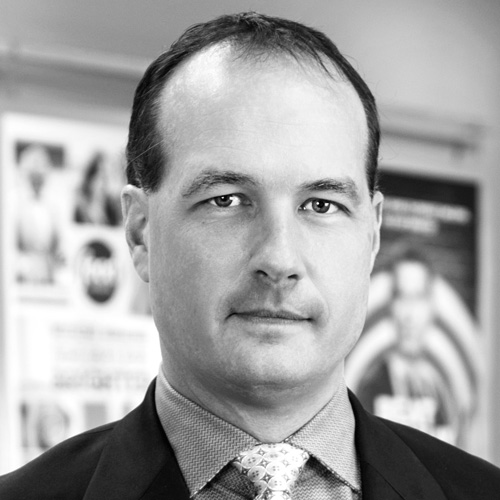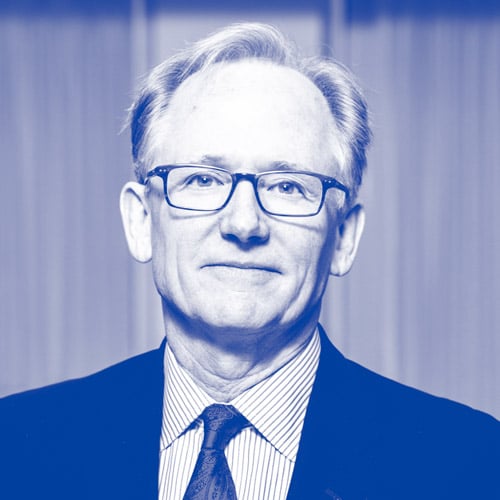In high school, Mark Schuermann won two state soccer championships and set scoring records. Later he set records with his Division I college team. Clearly he’s accustomed to excelling in his endeavors. This was certainly the case when he joined Scripps Networks Interactive in 1998 (then known as The E.W. Scripps Company) as senior auditor. Ten years later, at age thirty-six, he had risen through the ranks and was named senior vice president and treasurer of the Fortune 500 company.

Much of Schuermann’s work ethic and many of his professional accomplishments relate directly to the sort of qualities often associated with sports: contributing as part of a team, knowing how to adapt to changing circumstances, and overcoming challenges. But he believes that sports also taught him a great deal about leadership and how to appropriately gauge his own performance.
Using the Right Measuring stick
As a top-performing center midfielder, Schuermann took on team leadership roles at an early age. He also recognized that he could control certain outcomes, like playing harder or practicing longer to score more frequently. But things changed in college, where he found more players at his advanced skill and talent levels. There he learned that there are times on the field—as there are in a business career—when the best efforts may not translate into the desired results.
“You have to have the self-confidence to know that you did your best and tried every strategy you could,” Schuermann says. “The wins and losses become less accurate measures of your success. It’s about how well you did your job.”
That principle serves as a reminder to him to be adaptable as a leader and manager. He recalls an instance with a previous company when the conclusions of an audit project were not what his manager expected. As a result, the project group was blamed for how the audit was executed.
“As a leader, you need to step back and assess whether your expectations are appropriate,” Schuermann says. “If you trust your people, you have to be willing to acknowledge your own role in unexpected or
undesirable results.”
That perspective is in keeping with the importance he places on leading by example. Schuermann feels that this applies to everything, from how a leader dresses and talks to his or her team to being authentic and approachable—even to taking risks.
“You have to encourage your team to take chances,” Schuermann says. “It helps them grow, feel empowered, and that they’re contributing and making a difference. As a leader, the hard part is that you have to stay genuinely open to their ideas and accepting of the possibility that they might fail.”
Schuermann put this philosophy into practice last year during Scripps’ recent
$2 billion acquisition of TVN, Poland’s premier multiplatform media company. As the largest acquisition in the company’s history, there were limitations on disclosing proprietary information before the deal closed because both companies are public. As a certified risk manager and certified M&A adviser, Schuermann had to let the Scripps teams he managed proceed with certain calculated risks as part of due diligence.
Mentoring as a Part of Leading
Surprisingly, Schuermann never had formal mentors as his career progressed. Instead, he identified individuals he admired and asked them lots of questions. Although he still had to figure out day-to-day challenges on his own, he feels the diversity of perspectives and opinions he collected was
tremendously valuable.
Today, Scripps’ treasurer thoroughly enjoys providing employees with the guidance he had to seek on his own. However, he finds it challenging (both for himself and his mentees) to make time in the digital workplace where everyone is routinely asked to do more with less. Before there were so many digital connections and intrusions, he remembers when it was much easier to talk with employees and focus on being a good leader, manager, and mentor.
“Today it’s much more difficult to devote time to developing people’s skills and talents,” Schuermann says. “You have to find new ways to bring them along, like delegating responsibilities and empowering them to make decisions.”
Another tactic Schuermann uses is providing firsthand experience to new employees by bringing them into meetings where they have no experience or expertise. He then spends time with them afterward to answer questions, provide a broader context, and ensure they have a clear view of what they need to learn and how they can contribute in the future.
Yet, Schuermann also cautions younger employees to strike a balance between their education and work experience. To illustrate, he refers to new MBA graduates who have gone through undergraduate and graduate school without ever having worn a suit or been in a business meeting.
“Work experience is frequently undervalued, so as smart and capable as today’s students are, they need to understand that there’s a progression as you work your way up in your career. Being patient and getting the right training at the right time are all part of the process everyone has to go through,” Schuermann says.
It is worth noting that he has followed his own advice. Schuermann was certified in risk management and as a merger and acquisition adviser only after he had been treasurer for several years.
Leadership in a Changing Environment
Schuermann admits that today’s workforce is more adaptable to frequent changes than most of the individuals charged with leading them. That makes it important for managers and executives to stay well informed, to understand industry dynamics, and how shifts impact the business. “If you can’t change, you’re a less effective leader. It’s important to learn how to improvise in this new world,” Schuermann says.
But how does the treasurer manage so many shifts and changing priorities? Schuermann refers to his family as the one constant that inspires him. “They depend on me, so it’s like being part of a different kind of team,” he says. “I still do whatever it takes to get the job done. I’m just not kicking a ball around anymore.”

